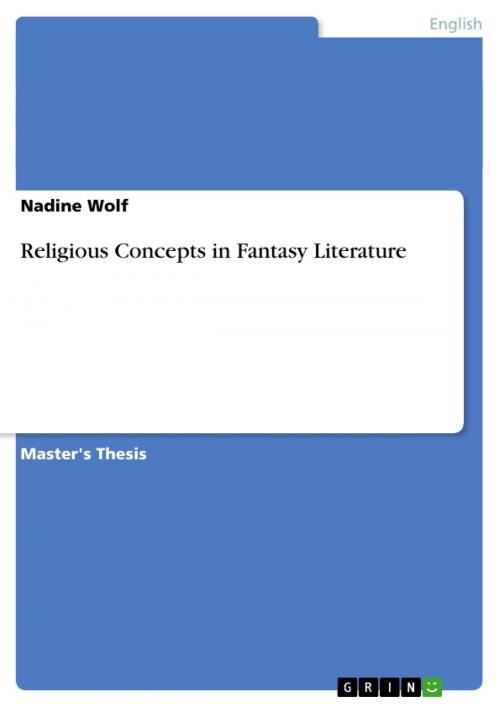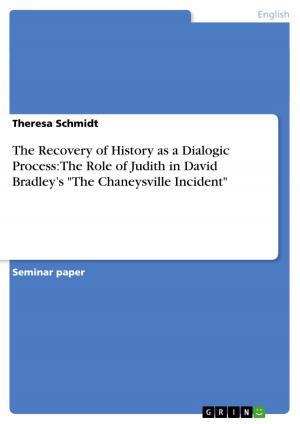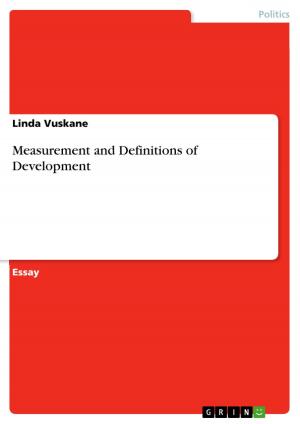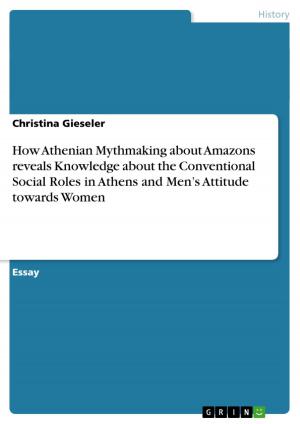| Author: | Nadine Wolf | ISBN: | 9783640661572 |
| Publisher: | GRIN Publishing | Publication: | July 14, 2010 |
| Imprint: | GRIN Publishing | Language: | English |
| Author: | Nadine Wolf |
| ISBN: | 9783640661572 |
| Publisher: | GRIN Publishing |
| Publication: | July 14, 2010 |
| Imprint: | GRIN Publishing |
| Language: | English |
Master's Thesis from the year 2008 in the subject English Language and Literature Studies - Literature, grade: 2,0, University of Bayreuth, language: English, abstract: For a long time, the genre of fantasy has not been regarded as 'real' literature, because it apparently did not deal with problems from the real world and was often published in cheap paperbacks or journals. Furthermore, because its story did not take place in the real world, it was deemed to be unimportant and inconsequential. This was the reason why writers of fantastic stories could not until the middle of the twentieth century openly write about strange worlds which were so much different from ours. They had to disguise their stories as wondrous travel stories or accounts of strange dreams. However, things changed. J. R. R. Tolkien's novels became an immediate success and prepared the readers for all those other fantasy writers who followed. This is one of the reasons why he is considered to be the father of modern fantasy. Among the fantasy genre, there are various sub-genres. I will focus on the Dragonlance series by Margaret Weis and Tracy Hickman, which is a mixture of Epic Fantasy and Sword & Sorcery. The next work, the trilogy His Dark Materials by Philip Pullman, is Children's Fantasy, with the main protagonists being adolescents. Lastly, I will single out an aspect from the science fiction series Star Wars by George Lucas, which is his concept of the Force. The genres of science fiction and fantasy are closely related, because the first depicts a fictional future or a fictional future civilisation in a different universe, and the latter often depicts fictional stories that, were it not for their fantastic elements, could well have taken place somewhere in the past. Therefore, it is not too astonishing that elements of science fiction stories could just as well exist in fantasy literature. The religious concepts which I will analyse in this thesis are taken from various culture groups. 'Religious concepts' is a term in which I include, for one, concepts and ideas that deal with rituals or beliefs in connection with any kind of higher beings. It also includes ideas or philosophies which require some kind of 'believing'. Also, single aspects of religions like the idea of dualism from the gnostics or the concept of balance, which can be found for example in Buddhism, belong to the definition of 'religious concepts' in this thesis as well as various religious teachings. Additionally, I will take the various movies related to the three stories into consideration, because they provide further information and facts for interpretation.
Master's Thesis from the year 2008 in the subject English Language and Literature Studies - Literature, grade: 2,0, University of Bayreuth, language: English, abstract: For a long time, the genre of fantasy has not been regarded as 'real' literature, because it apparently did not deal with problems from the real world and was often published in cheap paperbacks or journals. Furthermore, because its story did not take place in the real world, it was deemed to be unimportant and inconsequential. This was the reason why writers of fantastic stories could not until the middle of the twentieth century openly write about strange worlds which were so much different from ours. They had to disguise their stories as wondrous travel stories or accounts of strange dreams. However, things changed. J. R. R. Tolkien's novels became an immediate success and prepared the readers for all those other fantasy writers who followed. This is one of the reasons why he is considered to be the father of modern fantasy. Among the fantasy genre, there are various sub-genres. I will focus on the Dragonlance series by Margaret Weis and Tracy Hickman, which is a mixture of Epic Fantasy and Sword & Sorcery. The next work, the trilogy His Dark Materials by Philip Pullman, is Children's Fantasy, with the main protagonists being adolescents. Lastly, I will single out an aspect from the science fiction series Star Wars by George Lucas, which is his concept of the Force. The genres of science fiction and fantasy are closely related, because the first depicts a fictional future or a fictional future civilisation in a different universe, and the latter often depicts fictional stories that, were it not for their fantastic elements, could well have taken place somewhere in the past. Therefore, it is not too astonishing that elements of science fiction stories could just as well exist in fantasy literature. The religious concepts which I will analyse in this thesis are taken from various culture groups. 'Religious concepts' is a term in which I include, for one, concepts and ideas that deal with rituals or beliefs in connection with any kind of higher beings. It also includes ideas or philosophies which require some kind of 'believing'. Also, single aspects of religions like the idea of dualism from the gnostics or the concept of balance, which can be found for example in Buddhism, belong to the definition of 'religious concepts' in this thesis as well as various religious teachings. Additionally, I will take the various movies related to the three stories into consideration, because they provide further information and facts for interpretation.















